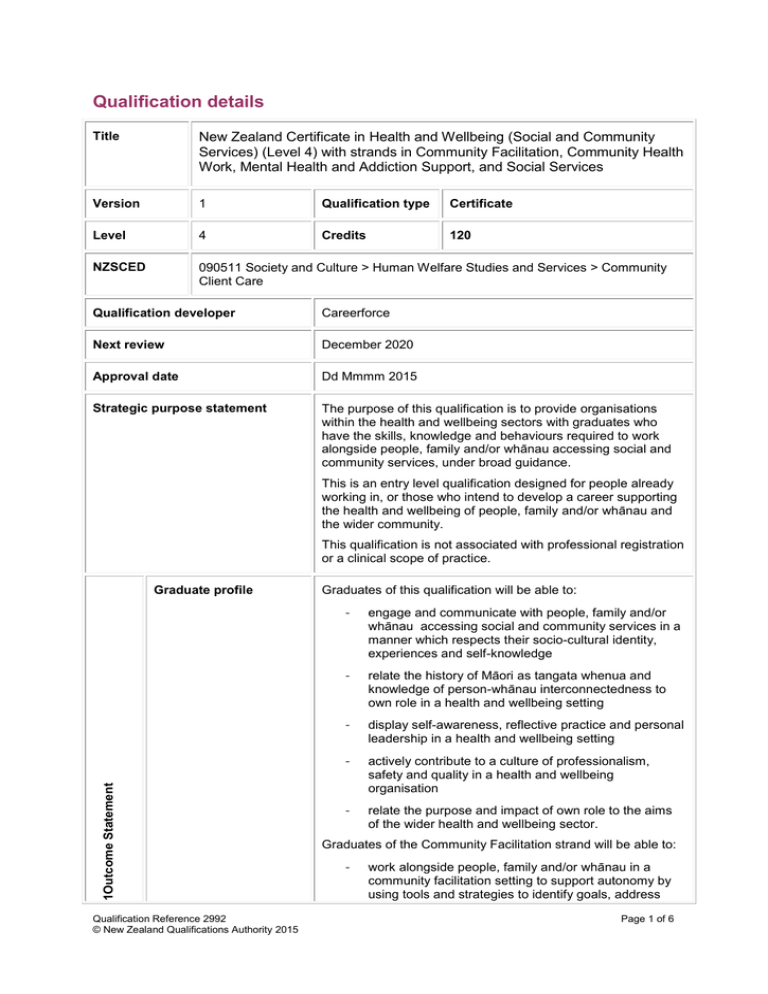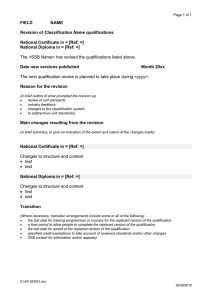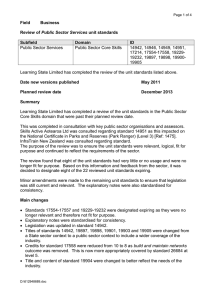Qualification details
advertisement

Qualification details Title New Zealand Certificate in Health and Wellbeing (Social and Community Services) (Level 4) with strands in Community Facilitation, Community Health Work, Mental Health and Addiction Support, and Social Services Version 1 Qualification type Certificate Level 4 Credits 120 NZSCED 090511 Society and Culture > Human Welfare Studies and Services > Community Client Care Qualification developer Careerforce Next review December 2020 Approval date Dd Mmmm 2015 Strategic purpose statement The purpose of this qualification is to provide organisations within the health and wellbeing sectors with graduates who have the skills, knowledge and behaviours required to work alongside people, family and/or whānau accessing social and community services, under broad guidance. This is an entry level qualification designed for people already working in, or those who intend to develop a career supporting the health and wellbeing of people, family and/or whānau and the wider community. This qualification is not associated with professional registration or a clinical scope of practice. 1Outcome Statement Graduate profile Qualification Reference 2992 © New Zealand Qualifications Authority 2015 Graduates of this qualification will be able to: - engage and communicate with people, family and/or whānau accessing social and community services in a manner which respects their socio-cultural identity, experiences and self-knowledge - relate the history of Māori as tangata whenua and knowledge of person-whānau interconnectedness to own role in a health and wellbeing setting - display self-awareness, reflective practice and personal leadership in a health and wellbeing setting - actively contribute to a culture of professionalism, safety and quality in a health and wellbeing organisation - relate the purpose and impact of own role to the aims of the wider health and wellbeing sector. Graduates of the Community Facilitation strand will be able to: - work alongside people, family and/or whānau in a community facilitation setting to support autonomy by using tools and strategies to identify goals, address Page 1 of 6 barriers and achieve aspirations. Graduates of the Community Health Work strand will be able to: - work alongside people, family and/or whānau in a community health setting to support autonomy by using tools and strategies to promote self-management of health and wellbeing. Graduates of the Mental Health and Addiction Support strand will be able to: - work alongside people, family and/or whānau in a mental health addiction setting to support autonomy by using tools and strategies to foster hope, support recovery and build resilience. Graduates of the Social Services strand will be able to: - Education pathway work alongside people, family and/or whānau in a social service setting to support autonomy by using tools and strategies to reduce vulnerability and build resilience. This qualification may build on the New Zealand Certificate in Health and Wellbeing (Level 3) [Ref: 2470], or the New Zealand Certificate in Youth Work (Level 3) [Ref: 2448], or the National Certificate in Educational Achievement. For graduates who intend to pursue further study related to health and wellbeing, this qualification may lead on to the New Zealand Certificate in Public Health and Health Promotion (Level 5) [Ref: 1865], New Zealand Diploma in Addiction Studies (Applied) (Level 6) [Ref: 2733] or bachelor’s degrees in related health and wellbeing subject areas. For graduates who intend to pursue further study related to leadership and management, this qualification may lead on to the New Zealand Certificate in Business (First Line Management) (Level 4) [Ref: 2456], the New Zealand Diploma in Business (Level 5) [Ref: 2459] and New Zealand Diploma in Business (Level 6) [Ref: 2460] or bachelor’s degrees in related leadership and management subject areas. Employment pathway Graduates of this qualification will have the skills and knowledge to be employed in a range of roles working alongside people, family and whānau across health and wellbeing sectors. Graduates of the Community Facilitation strand will be employed in roles supporting people to identify and achieve their aspirations including disability support, diversional therapy, employment, housing and budget support and information provision. Graduates of the Community Health Work strand will be employed in roles supporting people to self-manage their health and wellbeing including tamariki ora support, field officers, health and/or wellbeing coaches and community health work. Graduates of the Mental Health and Addiction Support strand will be employed in roles supporting people foster hope and support recovery including mental health and addiction support Qualification Reference 2992 © New Zealand Qualifications Authority 2015 Page 2 of 6 work. Graduates of the Social Services strand will be employed in roles supporting people to reduce vulnerability and build resilience including family violence support, social justice advocacy, community development work and refugee support. Qualification specifications Qualification award This qualification can be awarded by an organisation which has an approved programme of study or industry training programme leading to the qualification. The certificate will display the title of the qualification and the logos of the New Zealand Qualifications Framework, and the name and/or logo of the awarding tertiary education organisations. Evidence requirements for assuring consistency Evidence may include: - Assessment information leading to the achievement of the graduate outcomes - A portfolio of student work relating to the qualification - Stakeholder feedback on outcome achievement which may include feedback from graduates, end-users, and/or next users - TEO moderation outcomes which may include moderation/benchmarking across common programmes - Relevant External Evaluation and Review (EER) data. Minimum standard of achievement and standards for grade endorsements The minimum standard of achievement for the qualification is the achievement of all of the core outcomes and one of the strands. Other requirements for the qualification (including regulatory body or legislative requirements) Candidates for this qualification should be aware that employees and volunteers working in the health and wellbeing sectors are required to undergo initial and ongoing checks to ensure they are a fit and proper person to provide support. General conditions for the programme leading to the qualification General conditions for programme Programmes leading to this qualification must include a minimum of 200 hours of workplace practice and experience which contributes to the achievement of the qualification's outcomes. Workplace practice may include individual and/or group reflection and supervision facilitated by an education provider. The application of person-centred and directed, goal-centred and strengths-based approaches is inherent in the performance of the outcomes and must be developed as part of programmes leading to the qualification. Programmes must include a consideration of the specific capabilities, vulnerabilities and needs of children in the relevant context. Programmes that reflect the cultural and social aspirations of Qualification Reference 2992 © New Zealand Qualifications Authority 2015 Page 3 of 6 Māori and Pasifika learners must include culturally appropriate resources and delivery methods. Programmes leading to this qualification must adhere to and be consistent with any ethical, legislative or contractual requirements to which the setting or role is subject. Conditions relating to the Graduate profile Qualification outcomes 1 Conditions Engage and communicate with people, family and/or whānau accessing social and community services in a manner which respects their socio-cultural identity, experiences and selfknowledge 15 credits 2 Relate the history of Māori as tangata whenua and knowledge of person-whānau interconnectedness to own role in a health and wellbeing setting 10 credits 3 Display self-awareness, reflective practice and personal leadership in a health and wellbeing setting 15 credits 4 Actively contribute to a culture of professionalism, safety and quality in a health and wellbeing organisation 15 credits 5 Relate the purpose and impact of own role to the aims of the wider health and wellbeing sector 15 credits Community Facilitation strand 6 Work alongside people, family and/or whānau in a community facilitation setting to support autonomy by using tools and strategies to identify goals, Qualification Reference 2992 © New Zealand Qualifications Authority 2015 Page 4 of 6 address barriers and achieve aspirations 50 credits Community Health Work strand 7 Work alongside people, family and/or whānau in a community health work setting to support autonomy by using tools and strategies to promote the selfmanagement of health and wellbeing 50 credits Mental Health and Addiction Support strand 8 Work alongside people, family and/or whānau in a mental health and addiction setting to support autonomy by using tools and strategies to foster hope, support recovery, and build resilience 50 credits Social Services strand 9 Work alongside people, family and/or whānau in a social services setting to support autonomy by using tools and strategies to reduce vulnerability and build resilience 50 credits Transition information Replacement information Qualification Reference 2992 © New Zealand Qualifications Authority 2015 This qualification replaces the following national qualifications: - National Certificate in Social Services (Level 4) [Ref: 0250] - National Certificate in Diversional Therapy (Level 4) [Ref: 0727] - National Certificate in Social Service Work with Abuse Neglect and Violence (Level 4) [Ref: 0845] - National Certificate in Tamariki Ora – Well Child Services with strands in Mainstream, Māori, and Pacific (Level 4) [Ref: 1089] - National Certificate in Employment Support (Level 4) [Ref:1173] Page 5 of 6 - National Certificate in Mental Health and Addiction (Level 4) with optional strands in Addiction, Family/Whānau, and Kaupapa Māori [Ref: 1678] - National Certificate in Community Support Services (Disability Information Provision) (Level 4) [Ref: 1406] Learners currently enrolled in programmes leading to the replaced qualifications may either complete the requirements as specified below, or transfer their results to this replacement qualification. The last date for entry into programmes leading to the replaced qualifications is 31 December 2017. The last date for award of the replaced qualification is 31 Dec 2019. It is the intention of Careerforce that no existing trainee should be disadvantaged by these transition arrangements. Any person who considers they have been disadvantaged may appeal to: Careerforce PO Box 2637 Wellington 6140 Email: info@careerforce.org.nz Qualification Reference 2992 © New Zealand Qualifications Authority 2015 Page 6 of 6



